100+ Creative Employee Award Titles and Ideas to Boost Workplace Recognition
Discover 60+ employee award titles to celebrate excellence across performance, leadership, teamwork, and tenure. Motivate and retain talent with thoughtful recognition ideas.
On this page
- What are employee awards?
- Importance of employee awards titles
- List of creative employee recognition award ideas and titles with categories
- 23 Fun employee award ideas
- 20 Examples of team awards titles
- Types of employee awards programs
- Best practices for designing an effective awards program
- How Empuls supports your recognition goals
- Conclusion
Employee recognition awards 🏆🥇 are the best way to convey your appreciation and gratitude for the excellent work delivered by your teams.
When designing your employee recognition categories for employee award program, think of the entire employee journey. An employee starts as an applicant, comes on board as a new hire, completes those tough first six to twelve months, and then goes about completing critical milestones until exit or retirement.
Your recognition awards 🏆🥇 can span each of these stages in the employee’s journey, apart from recognizing extraordinary performance, goal achievements, and positive behaviours that align with the company’s values.
Getting the wording right for your employee recognition awards can be a game-changer. Take a cue from companies like Waffle House, which have come up with a brilliant way of combining recognition with promotions.
This blog will share some creative employee recognition award titles and ideas you can add to your employee recognition program.
Let's dive in!
What are employee awards?
An employee award is a prize, or a token of appreciation given to an employee for accomplishing something exceptional, like doing incredible work or contributing to a specific field.
Employees who work hard and go the extra mile deserve to be rewarded. Awarding employees motivates them and brings a sense of gratification and belonging.
Awards bring about a sense of achievement and acknowledgement for the hard work employees put in. Awards are usually given whenever an achievement is complete, or a milestone is crossed.
Encouraging employees to complete tasks brings greater productivity and ensures that duties and responsibilities are handled promptly.
Creating fun and outstanding employee recognition award isn't rocket science, yet it can be challenging. If you're looking for employee award ideas to motivate and surprise your employees, you've come to the right place.
Below you will find 60 creative employee recognition award titles and ideas that are easier on your budget but better in terms of inspiration.
Importance of employee awards titles
Employee awards titles can play a significant role in recognizing and motivating employees in the workplace. While the awards themselves are essential for acknowledging outstanding performance, the titles associated with these awards add an extra layer of meaning and impact. Here are some reasons why employee awards titles are important:
- Positive company culture: Titles and recognition contribute to a positive company culture where employees feel appreciated and acknowledged. This, in turn, can lead to better teamwork and collaboration, ultimately improving team performance.
- Recognition and validation: Employee awards titles provide formal recognition and validation of an employee's achievements and contributions. They acknowledge that the recipient has excelled in a particular area or demonstrated exceptional skills.
- Motivation and morale: Titles make employees feel valued and appreciated for their hard work. When employees see that their efforts are recognized with titles such as "Employee of the month” or "Top sales performer," it can boost their morale and motivation to continue performing at a high level.
- Goal setting and aspiration: Employee awards titles can serve as goals for other employees to aspire to. When they see their colleagues receiving titles and recognition, it can inspire them to work harder and strive for similar achievements.
- Peer recognition: Employee awards titles are often awarded based on the input or nominations of peers and colleagues. This peer recognition can be particularly meaningful as it reflects the respect and admiration of one's coworkers.
- Differentiation and prestige: Titles differentiate high achievers from others and confer a sense of prestige. Employees who receive titles like "Leader of the year" or "Innovator of the year" are seen as leaders and experts in their respective fields.
- Retention and engagement: Recognized employees are more likely to feel engaged and satisfied with their jobs. They are also more likely to stay with their current employer, reducing turnover and the associated costs.
- Skill and talent development: Awards titles can help identify specific skills or talents in employees. This can guide training and development efforts, allowing employees to further hone their strengths.
- Positive company culture: Titles and recognition contribute to a positive company culture where employees feel appreciated and acknowledged. This, in turn, can lead to better teamwork and collaboration.
- Customer and client confidence: In customer-facing roles, employee awards titles can instill confidence in clients and customers. Knowing that they are working with a "Customer service star" or "Top account manager" can enhance the client experience.
- Marketing and branding: Some organizations use employee awards titles in their marketing and branding efforts. Highlighting the achievements of employees can showcase the company's commitment to excellence and expertise.
Employee awards titles go beyond just recognizing individual accomplishments; they contribute to a positive workplace culture, motivate employees, and help organizations showcase their commitment to excellence.
When used effectively, these titles can be a powerful tool for talent management and employee engagement.
List of creative employee recognition award ideas and titles with categories
We know that no company is the same, nor is the culture and office dynamics. Hence, we understand that not all employee recognition award 🏆🥇 categories will fit your workplace structure.
However, there are universal employee recognition award categories everywhere that are similar to your current employee rewards and recognition system.
Following are some creative employees award titles and employee award categories -
10 New hire awards

These award titles are used for appreciating top-performing new hires. This employee has performed remarkably well within their first month/quarter/or year of joining the company.
Here are a few creative new employee recognition award ideas-
- Rookie Rockstar
- Rookie of the month/ quarter/ year
- Rookie Sailor
- Fast Starter
- Bright Beginner
- Dashing Debut
- Amazing Addition
- Budding Star
- Exceptional Hire
- Best First Impression
Top 10 performer recognition award

Performance awards or performance recognition awards 🏆🥇 are completely based on the efficiency and productivity of the employee at the workplace.
This award is for employees at the top of their game, slayers of deadlines, and are the best at what they do (no matter the time or circumstances).
Following are some creative employee award titles that best suit their attributes.
- Mr./Ms. Significant
- Precious Gem Award
- Superstar Award
- Prime Player Award
- Shining Star Award
- Mr/Ms WoW Machine
- Cloud 9Collaborator
- Pinnacle Performer
- Alpha player
- Mover of Mountains
10 Perfect attendance awards
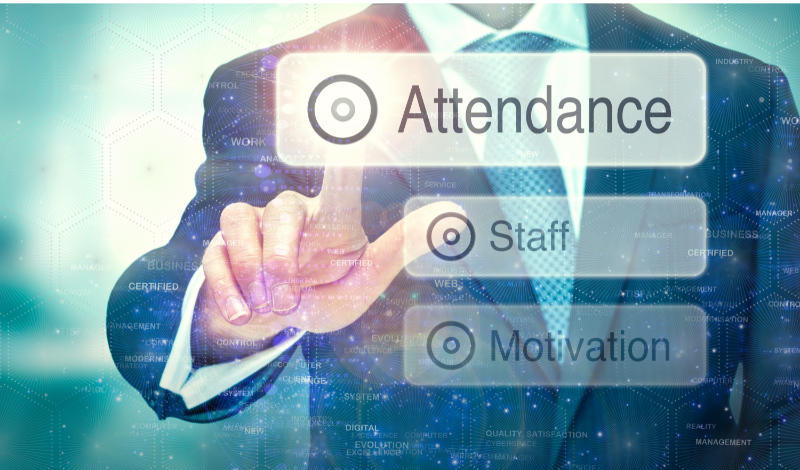
Perfect attendance shows employees’ dedication to working. Such behavior needs to be recognized.
With these awards, managers can use an attendance point system to applaud employees who are not skipping work and send a subtle message to employees with poor attendance to show them the benefit of not skipping work.
Some creative employee award titles in this category could be -
- Always Present Award
- Perfectly Present Award
- Happy Everyday Award
- Count You In
- Never Missed a Beat
- Dedicated Employee (Of the month/quarter/ year)
- Always Timely Award
- Mr./Ms. Consistent
- No Missed Opportunities
- Aced Attendance
10 Team award title ideas

When a team works exceptionally well and brings out great results from solid teamwork goals, they deserve to be awarded.
Here are a few creative award title ideas for such teams -
- League Of Superheroes
- The Dream Team
- The Fist Bump Award
- High Five Award
- Helping Hands
- Ace Alliance
- Synergic Force
- Force To Reckon With
- Squad Goals
- Super Squad
10 Mentor/leadership recognition award names

We have all had leaders and mentors who have made a significant difference through their guidance and helped us unlock our true potential or find our true calling.
Here are some great award titles to honor such bosses.
- Galactic Gratitude
- 3 Cheers
- The Transformer
- The Inspirer
- Key Differentiator
- The Jedi
- Mentoring Champion
- The Sensei
- The Helping Hand
- The Allstar
10 Customer service award title ideas

Customer service awards 🏆🥇 are for those who go beyond their call of duty to keep customers happy and content.
Here are a few customer service awards titles to remind them that you’ve noticed their hard work.
- Joy Givers
- Customer Success Champions
- Peace in the Chaos
- Distributor of smiles
- Super Satisfyer
- Calmer of Storms
- Client Whisperer
- Customer Comforter
- Client Care Champ
- Five-star Customer Service
10 Peer-to-peer awards title ideas

These awards are by the employees, the employees, and the employee. Employees choose a peer who exhibits trust, friendship, reliability, loyalty, kindness, etc., during the course of their work and has helped them achieve amazing results.
Here are a few award ideas for those exemplary peers -
- Above and Beyond
- Helping Hand
- Key contributor
- Outstanding Dependability
- Bestower of Energy
- Ultimate Team Player
- Everyday Hero Award
- Behind the Scenes Award
- Caught in the Act of Caring Award
- Makes My Day Award
10 Tenure awards title ideas

These are awards that celebrate employee stickiness and loyalty. Tenure awards help you recognize employees who chose to stick with you over the years and contribute to your success.
Consider recognizing the tenure of employees completing the following periods with your company.
- One
- Two
- Five
- Ten
- Fifteen
- Twenty
- Twenty-Five
- Thirty
- Thirty-Five
- Forty
While we have explored some awards that mean business, you can also have awards that are offbeat.
Wondering what they can be? Let’s now look at some employee recognition award examples that are out-of-the-box and funny.
23 Fun employee award ideas
Recognizing employees for their unique contributions and personalities can significantly enhance workplace morale and foster a positive culture. Here’s a categorized list of creative award ideas that can add fun to your employee recognition program.
Fun and lighthearted awards
Following are eight fun and lighthearted award ideas for your team.
1. Celebrate positivity and humor
- The “Most Likely To Brighten Your Day” Award: For the employee who consistently brings positivity and cheer to the workplace.
- The “Master of Puns” Award: Recognizing the employee who never fails to crack a joke or make a pun during meetings.
- The “Silly Sock Day” Award: For the individual who wears the most outrageous or colorful socks, making them the office's fashion icon.
2. Recognize creativity and engagement
- The “Best Zoom Background” Award: Acknowledging the employee with the most creative virtual background during video calls.
- The “Office DJ” Award: Celebrating the employee who brings music into the workplace, creating a lively atmosphere.
- The “Most Creative Desk Decor” Award: For the employee with the most imaginative and personalized workspace.
3. Foster community and sharing
- The “Outstanding Snack Provider” Award: Recognizing the colleague who always shares treats with the team.
- The “Work-From-Home Warrior” Award: For those adapting to remote work challenges while maintaining productivity.
Practical work awards
Following are five practical work awards ideas to implement in the office.
1. Enhance communication and collaboration
- The “Excellence in Communication” Award: Highlighting an employee who communicates effectively across various channels.
- The “Outstanding Team Player” Award: Celebrating individuals who go the extra mile to support colleagues and promote teamwork.
2. Promote innovation and improvement
- The “Innovation Champion” Award: Recognizing employees who continually bring fresh ideas and creative solutions.
- The “Continuous Improvement” Award: For employees seeking ways to refine processes or improve workflows.
3. Acknowledge customer service excellence
- The “Customer Hero” Award: Acknowledging employees who consistently deliver exceptional customer service.
Funny work awards
Following are five funny work awards to consider:
1. Encourage humor and camaraderie
- The “Email Ninja” Award: For the employee who responds to emails faster than anyone else.
- The “Master Of The Office Prank” Award: Recognizing the colleague known for hilarious pranks that keep the office lively.
- The “Most Likely To Win A Karaoke Contest” Award: Celebrating employees who aren’t afraid to belt out tunes during team events.
2. Lighthearted acknowledgments of everyday challenges
- The “Coffee Spill Survivor” Award: Recognizing employees who handle coffee spills without losing their cool.
- The “Master Of The Dad Joke” Award: For colleagues who share cheesy dad jokes, fostering a lighthearted atmosphere.
Fun awards for employees working from home
Following are five fun awards for those who work remotely or from home.
1. Celebrate remote work achievements
- The “Best Home Office Setup” Award: Recognizing employees with impressive home office setups.
- The “Zoom Fashion Icon” Award: For those known for stylish attire during video calls.
2. Encourage participation in virtual settings
- The “Best Breakout Room Host” Award: Celebrating employees excelling at facilitating engaging discussions during breakout sessions.
- The “Creative Snack Ideas” Award: Recognizing employees sharing unique snack ideas during remote work.
- The “Work-From-Home Yoga Guru” Award: Highlighting employees promoting wellness through virtual yoga or meditation sessions.
By implementing these creative awards, you can foster a more engaging and enjoyable workplace culture that celebrates individuality while promoting teamwork and positivity!
20 Examples of team awards titles
Here’s a list of 20 team award ideas that can help recognize and celebrate your team members' contributions. Each award is designed to highlight specific qualities or achievements, fostering motivation and camaraderie within the workplace.
1. MVP (Most Valuable Player) award
This award is presented to the team that consistently excels in performance and collaboration throughout the year. It recognizes their dedication, hard work, and significant contributions to the organization's success.
2. Leadership excellence team award
This award honors the team that demonstrates outstanding leadership and vision and celebrates those who inspire others to achieve their best. Their ability to guide and motivate sets a benchmark for excellence within the organization.
3. Quality excellence award
This award goes to the team that maintains the highest quality standards in their work. It acknowledges their commitment to integrity, professionalism, and excellence in every project they undertake.
4. Resilience rockstars
Recognizing a team that has shown exceptional adaptability and perseverance in challenging situations, this award highlights their ability to turn obstacles into opportunities for growth and innovation.
5. Team spirit award
This award honors a team that embodies core organizational values while promoting positivity and encouragement among colleagues. Their enthusiasm fosters a supportive and collaborative work environment.
6. Efficiency experts
Awarded to teams that excel in optimizing processes and time management, this recognition emphasizes their role in enhancing productivity through effective documentation and streamlined workflows.
7. Innovative team of the year
This accolade celebrates a team that consistently brings forward-thinking ideas and creative solutions. Their innovative spirit drives progress and encourages a culture of continuous improvement.
8. Growth catalyst award
Recognizing teams that have shown remarkable growth over the year, this award highlights their development journey and commitment to personal and professional advancement.
9. Cross-functional collaboration champions
This award honors teams that effectively collaborate across departments to achieve common goals. Their ability to communicate and work together exemplifies teamwork at its finest.
10. Trailblazer trophy
Presented to teams that dare to explore new challenges, this trophy acknowledges their pioneering spirit in breaking barriers and implementing innovative approaches within the organization.
11. Coffee connoisseur in the team award
Celebrating the department known for keeping everyone caffeinated, this fun award recognizes teams maintaining a well-stocked coffee station, contributing to a vibrant workplace culture.
12. Tech troublemakers trophy
This award is given to the team known for their expertise in resolving technical issues swiftly. Their support ensures smooth operations and helps colleagues navigate challenges effectively.
13. Snack ninja in the team award
Recognizing teams with an impressive stash of snacks, this light-hearted award celebrates those who always have delicious treats on hand, enhancing workplace morale through shared culinary delights.
14. Meme master trophy
Awarded to the team that excels at using humor through memes, this trophy highlights their ability to lighten the mood in the office with timely and relevant humor.
15. Wizards of wordplay
This award celebrates teams with a knack for clever communication and humor, recognizing their contributions in making workplace interactions enjoyable and engaging.
16. King/queen of the copy machine
Honoring the team responsible for managing office printing needs efficiently, this award recognizes their efforts in ensuring reliable access to essential resources for all employees.
17. Most likely to survive a zombie apocalypse: Team Ed
A humorous take on teamwork, this award is given to those who demonstrate exceptional problem-solving skills and adaptability under pressure, showcasing their ability to thrive in any situation.
18. Office DJ extraordinaire
This fun recognition goes to the team member who curates the best playlists or keeps everyone entertained with music during work hours, contributing positively to office ambiance.
19. Everyday hero in your team award
Recognizing employees who consistently go above and beyond in their roles, this award celebrates those whose small acts of kindness significantly impact team morale and cohesion.
20. Culture champion in your team award
This award honors individuals or teams actively promoting company culture through engagement activities or initiatives, helping create an inclusive environment where everyone feels valued.
These awards acknowledge individual contributions and strengthen team bonds by celebrating collective achievements in a fun and engaging manner.
Types of employee awards programs
Employee awards programs come in many shapes and sizes, each designed to recognize different aspects of employee contributions. Here are ten types of employee awards programs that can help you celebrate various achievements within your organization and help you use the listed titles in the place of accordance.
1. Performance-based awards
Recognize employees who consistently exceed performance expectations. This could be in the form of “Employee of the Month” or “Top Performer” awards. These accolades celebrate individuals who go above and beyond in their roles, driving the success of the organization.
2. Service awards
Loyalty deservesitsgnition. Service awards honor employees for their long-term commitment to the company. Whether it’s a 5-year, 10-year, or 20-year milestone, these awards show appreciation for employees’ dedication and contribution over time.
3. Peer recognition
Sometimes, the best recognition comes from colleagues. Peer recognition programs empower employees to acknowledge and reward each other’s efforts. This can include awards like “Best Team Player” or “Most Helpful Colleague,” fostering a collaborative and supportive work environment.
4. Innovation and creativity awards
Creativity fuels progress. These awards recognize employees who bring innovative ideas or creative solutions to the table. Whether it’s a new product idea, a process improvement, or an out-of-the-box solution, these awards celebrate ingenuity and forward-thinking.
5. Team awards
Collaboration is key to success in any organization. Team awards recognize the achievements of a group of employees who have worked together to achieve a significant goal. This could be for completing a major project, meeting a challenging deadline, or achieving outstanding results as a team.
6. Customer service awards
Excellent customer service can set a company apart from its competitors. These awards recognize employees who consistently deliver outstanding service to customers, enhancing the company’s reputation and customer satisfaction.
7. Leadership awards
Great leaders inspire others to achieve their best. Leadership awards recognize individuals who demonstrate exceptional leadership qualities, whether in a formal management role or as a leader among peers.
These ten types of awards cover a broad spectrum of contributions, ensuring that every aspect of employee performance and behavior can be acknowledged and celebrated.
Best practices for designing an effective awards program
Creating an employee awards program that truly resonates with your team requires careful planning and thoughtful execution. Here are some best practices to ensure your awards program is both effective and impactful:
- Clear criteria: Transparency is key when it comes to recognition. Establishing clear, measurable criteria for awards ensures that all employees understand what is required to be recognized. This not only makes the program fairer but also helps to eliminate any perceptions of favoritism.
- Ensure inclusivity: An effective awards program should be accessible to all employees, regardless of their role or department. This means recognizing a wide range of contributions, from customer service excellence to innovation and teamwork.
- Keep it consistent: Consistency in awarding and recognizing employees is crucial. Whether it’s monthly, quarterly, or annually, sticking to a regular schedule helps to maintain the program’s momentum and ensures that recognition becomes an ingrained part of the company culture.
- Make it personal: Personalized recognition can have a deeper impact. Tailoring awards to the individual’s preferences, such as giving them the choice of their reward, or including a personal note from leadership, can make the recognition feel more meaningful.
- Promote the program effectively: For an awards program to be successful, employees need to be aware of it. Regularly promoting the program through internal communications, team meetings, and company events can help keep it top of mind.
- Celebrate publicly: Public recognition amplifies the impact of awards. Celebrating recipients in front of their peers not only boosts the individual’s morale but also sets a positive example for others.
- Regularly evaluate and adapt: An awards program should evolve with the company. Regularly evaluating the program’s effectiveness through employee feedback and participation rates can help you make necessary adjustments.
- Balance between individual and team recognition: While it’s important to recognize individual contributions, acknowledging team efforts is equally vital. A balanced approach ensures that both personal achievements and collaborative successes are celebrated.
- Link to company values: The awards program should align with the core values of the organization. When employees are recognized for behaviors that reflect the company’s mission and values, it reinforces a strong cultural foundation.
- Offer meaningful rewards: The rewards themselves should be desirable and relevant to the employees. This could range from monetary bonuses to experiences like extra vacation days or personalized gifts.
By following these best practices, you can design an employee awards program that not only recognizes contributions effectively but also strengthens the overall culture and engagement within your organization.
Best practices made easy with Empuls
Best practice | Empuls feature that supports it |
Clear criteria & fairness | Structured workflows & automated award setup |
Public celebration | Social feed, Wall of Fame, Wishboards |
Personalization | Branded certificates, curated gifts, custom messages |
Inclusivity | Multi-currency/language, multiple award types |
Frequency & consistency | Automated scheduling & reminders |
Data-driven evaluation | Engagement analytics & reward participation reports |
Not only best practices, Empuls can support your recognition goal as well.
How Empuls supports your recognition goals
No matter what your recognition goal is, with Empuls, you can establish a lot:
1. Recognition across the employee lifecycle
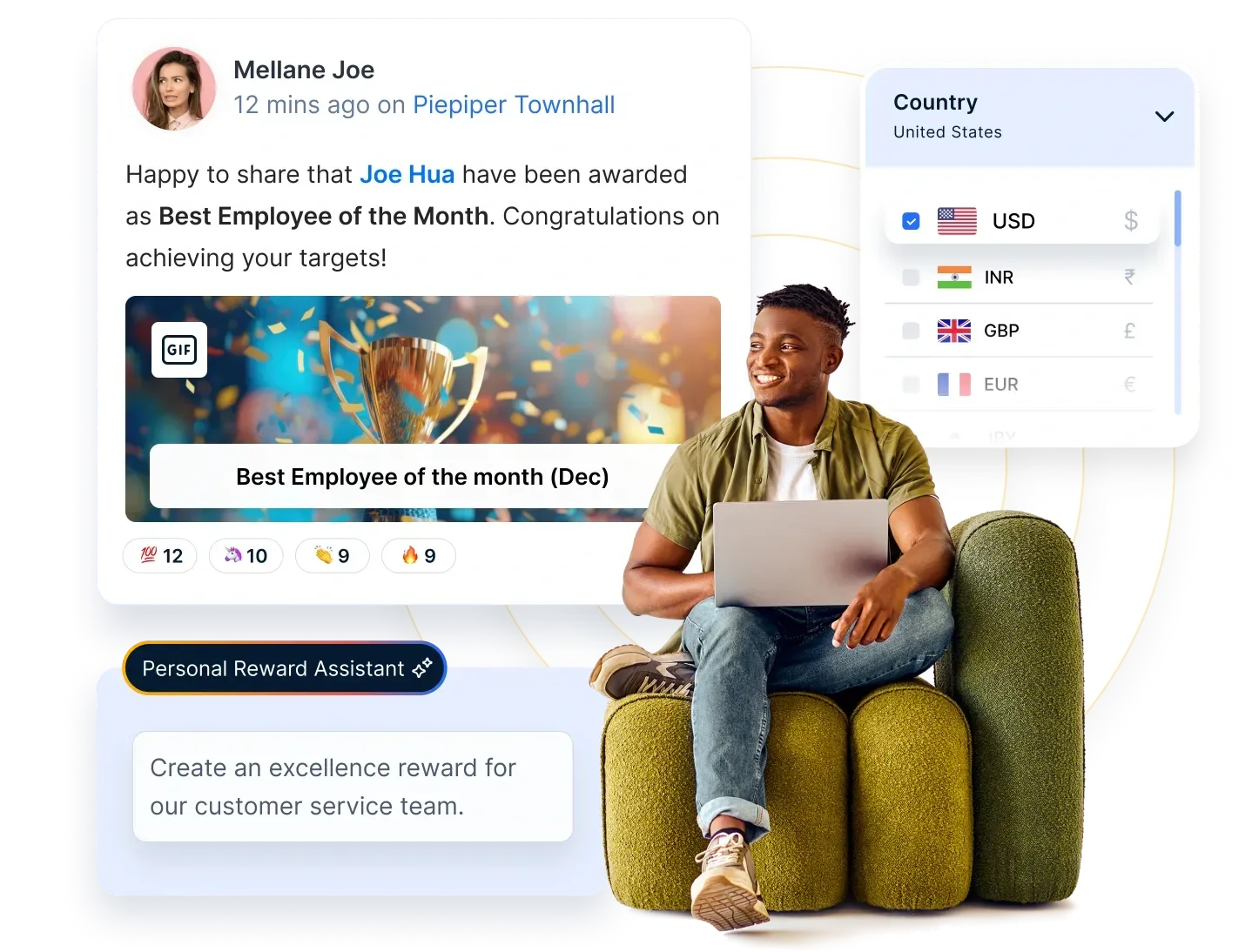
Empuls, a reward and recognition platform, helps celebrate every stage:
- New hires: Use automated "Rookie Rockstar" or "Bright Beginner" recognition
- Tenure awards: Automate service milestones like 1, 3, 5, or 10 years with Wishboards, digital certificates, and curated reward collections
- Performance awards: Recognize high performers with titles like "Pinnacle Performer" or "Superstar Award" and link to tangible rewards
2. Award types fully supported in Empuls
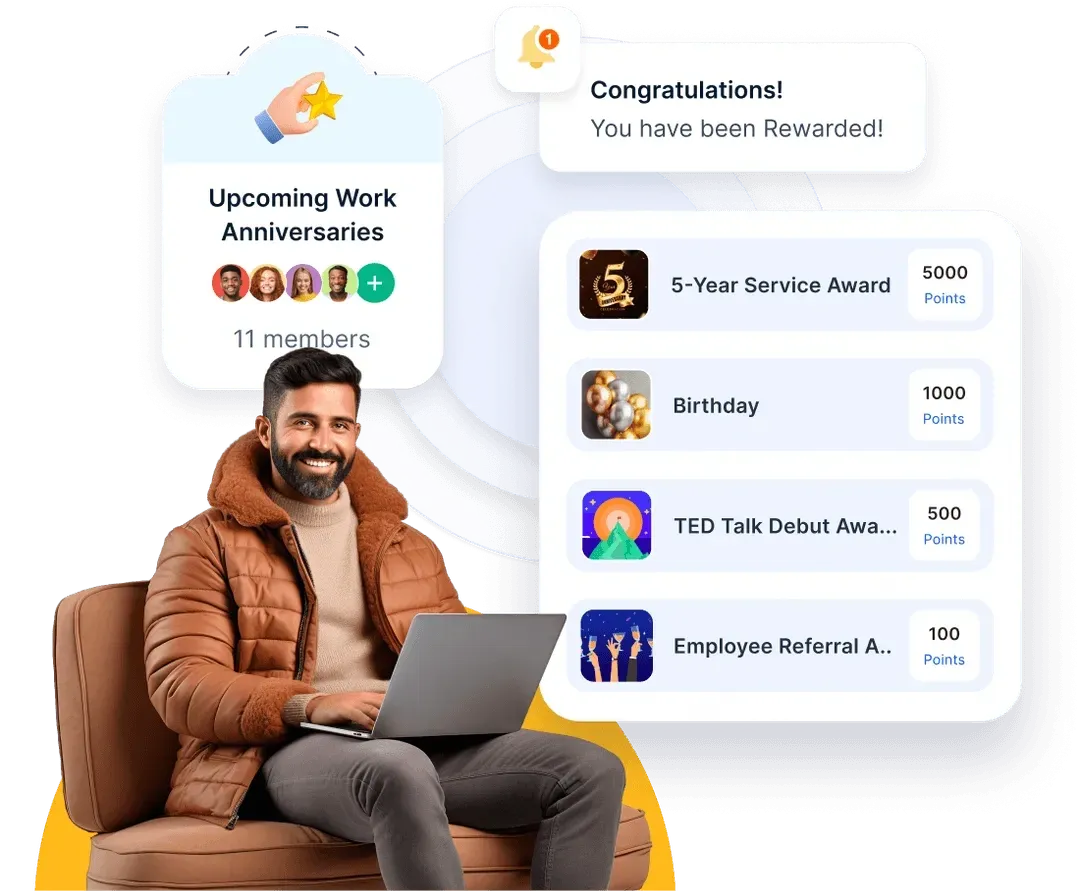
Provide service award, no matter which one you have in mind, with Empuls:
- Peer-to-peer recognition
- Spot awards
- Jury and nomination-based awards
- Milestone and service awards
- Value-based awards
- Learning & wellness rewards
These align perfectly with your categories like:
- Top performer awards
- Leadership & mentor awards
- Customer service awards
- Funny/offbeat titles
3. Automation & AI nudges

Empuls uses AI-powered assistant ‘Em’ to:
- Prompt weekly achievements
- Suggest in-the-moment recognition
- Nudge managers when recognition gaps appear
This ensures no great effort goes unnoticed — even the quirky ones like “Office DJ” or “Walking Encyclopedia.”
4. Recognition feeds & wall of fame
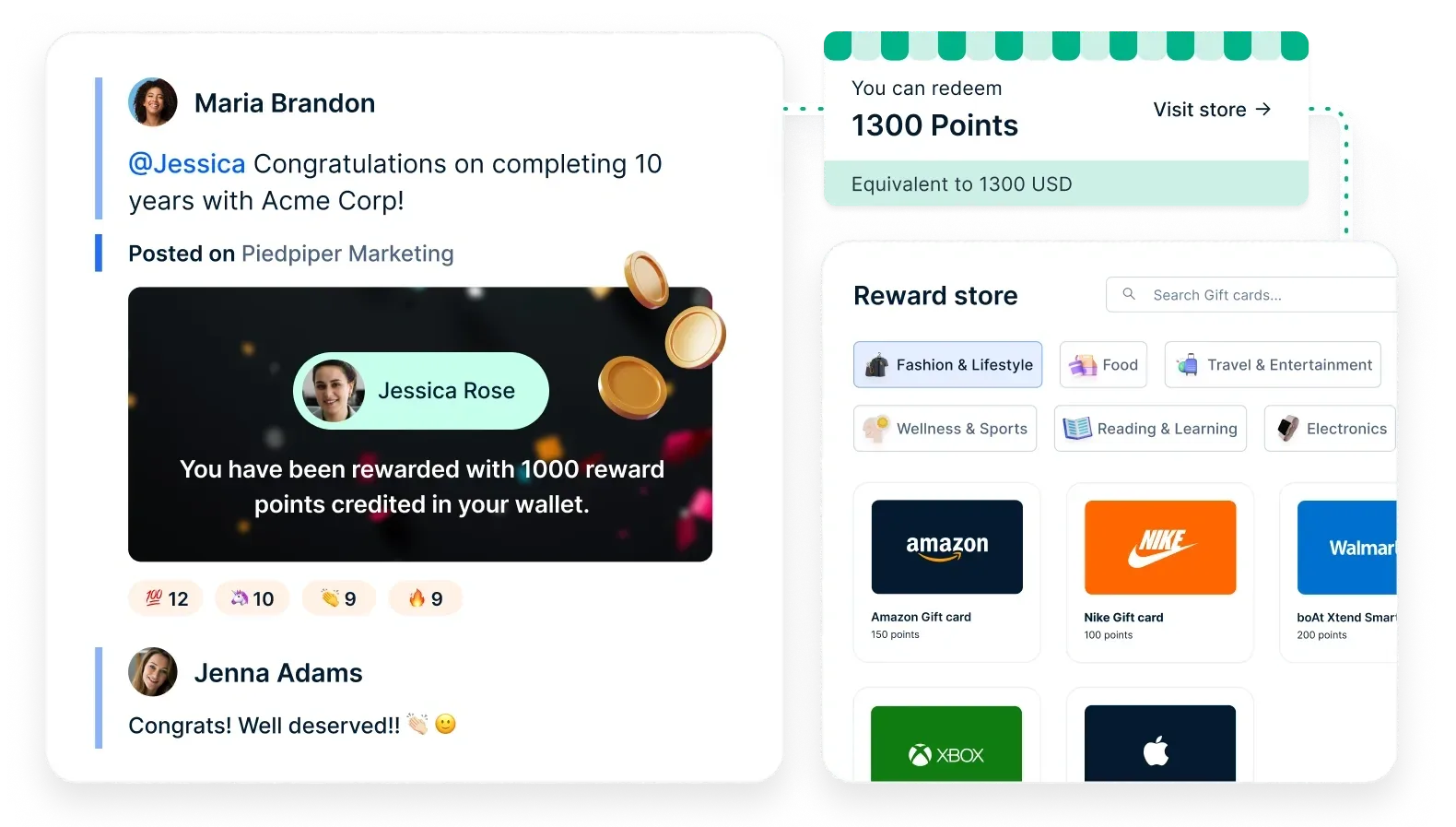
- Celebrate awards publicly via Wall of Fame, social feed, and Wishboards
- Drive a culture of appreciation and visibility across departments and locations
5. Global reward options
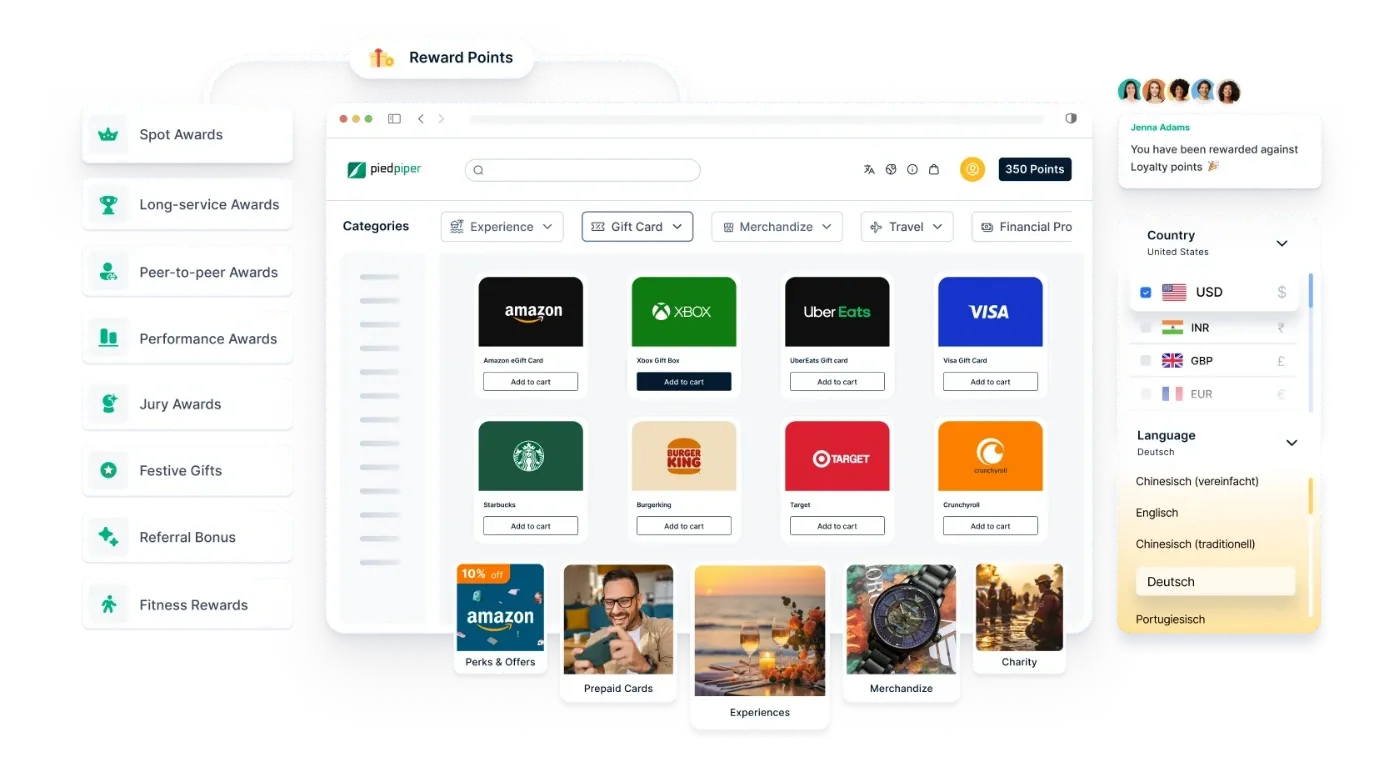
Back your award titles with meaningful rewards:
- 1M+ global catalog options: gift cards, experiences, wellness, charity, Amazon store, and swag
- Pay-on-redemption model to reduce cost
- Localized rewards across 100+ countries
Pair your creative award titles with Empuls' recognition badges and AI-powered nudges. For example: “Mentoring Champion” → Badge: “Wisdom Wizard” or “Super Snacker” → Fun shout-out on the feed with emojis & GIFs. Want more of a tailored demo on how Empuls can make recognition easy? Schedule a call with our experts now!
Conclusion
At the end of the day, though, employee recognition is about one thing: celebrating achievements and thanking employees for their hard work. There are countless ways to inspire your staff and employee award titles are one of them. Showcase your company culture by creating aspirational employee awards. Develop an exceptional employee recognition program that serves as the best tool for employee retention and talent attraction.


















